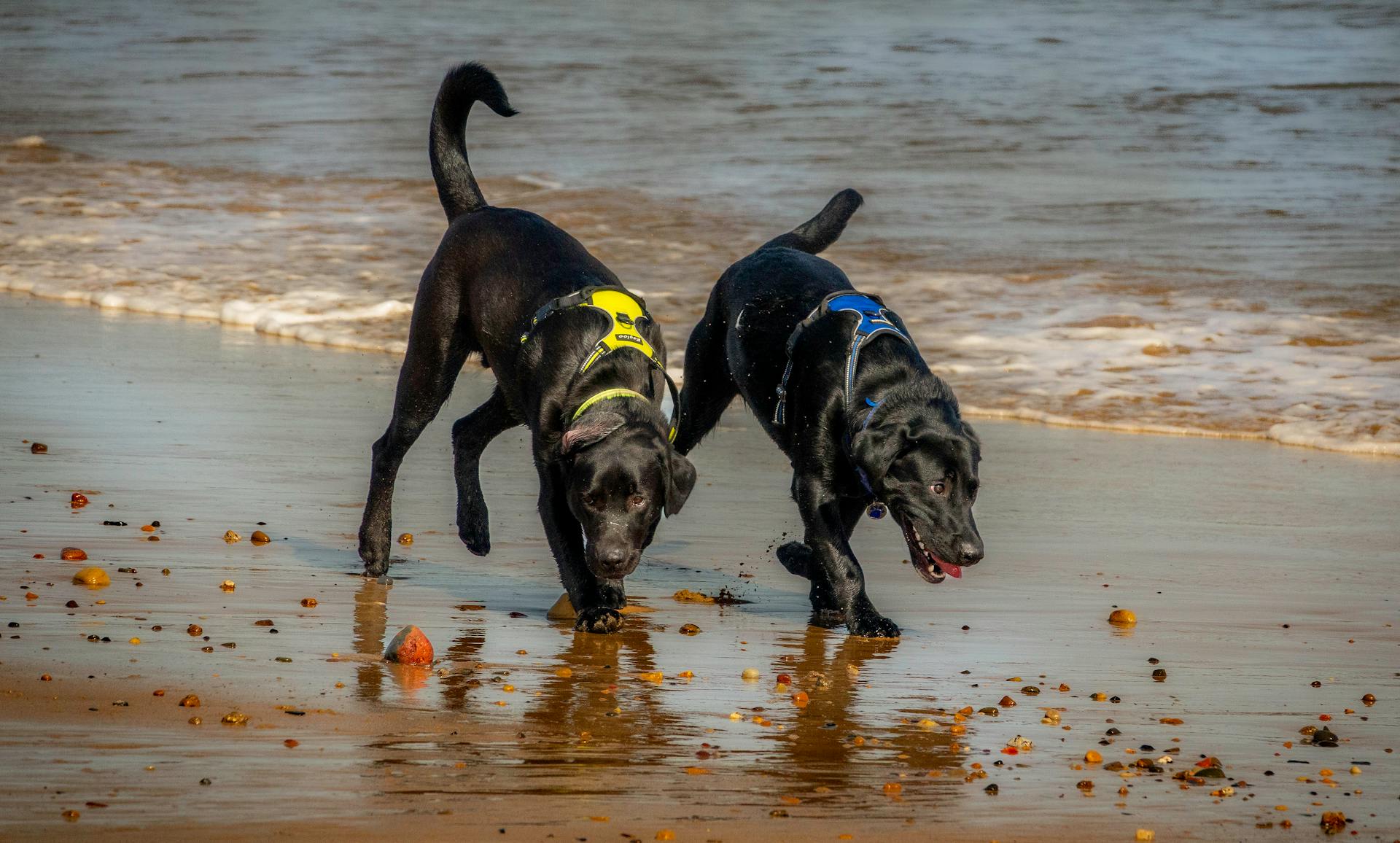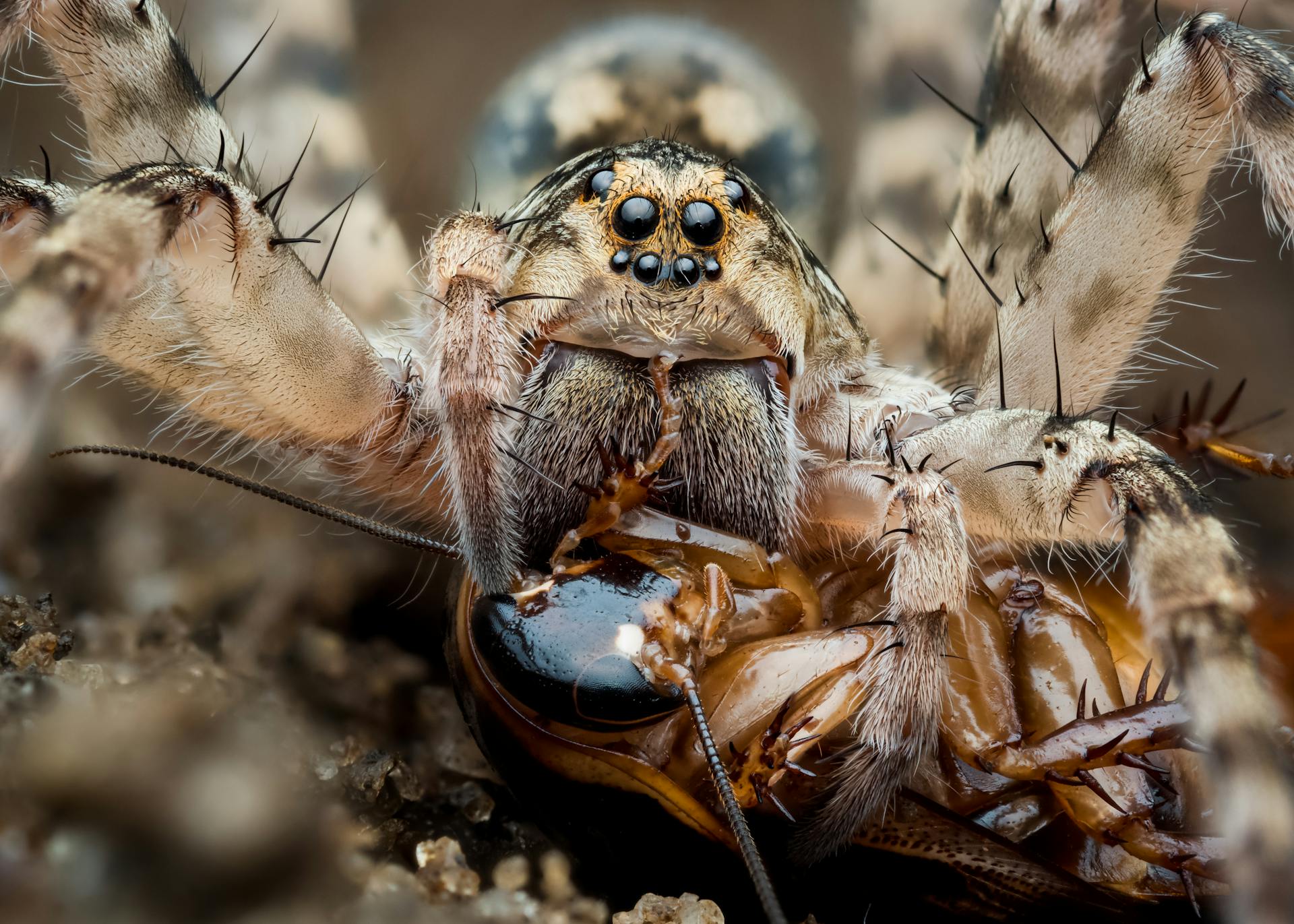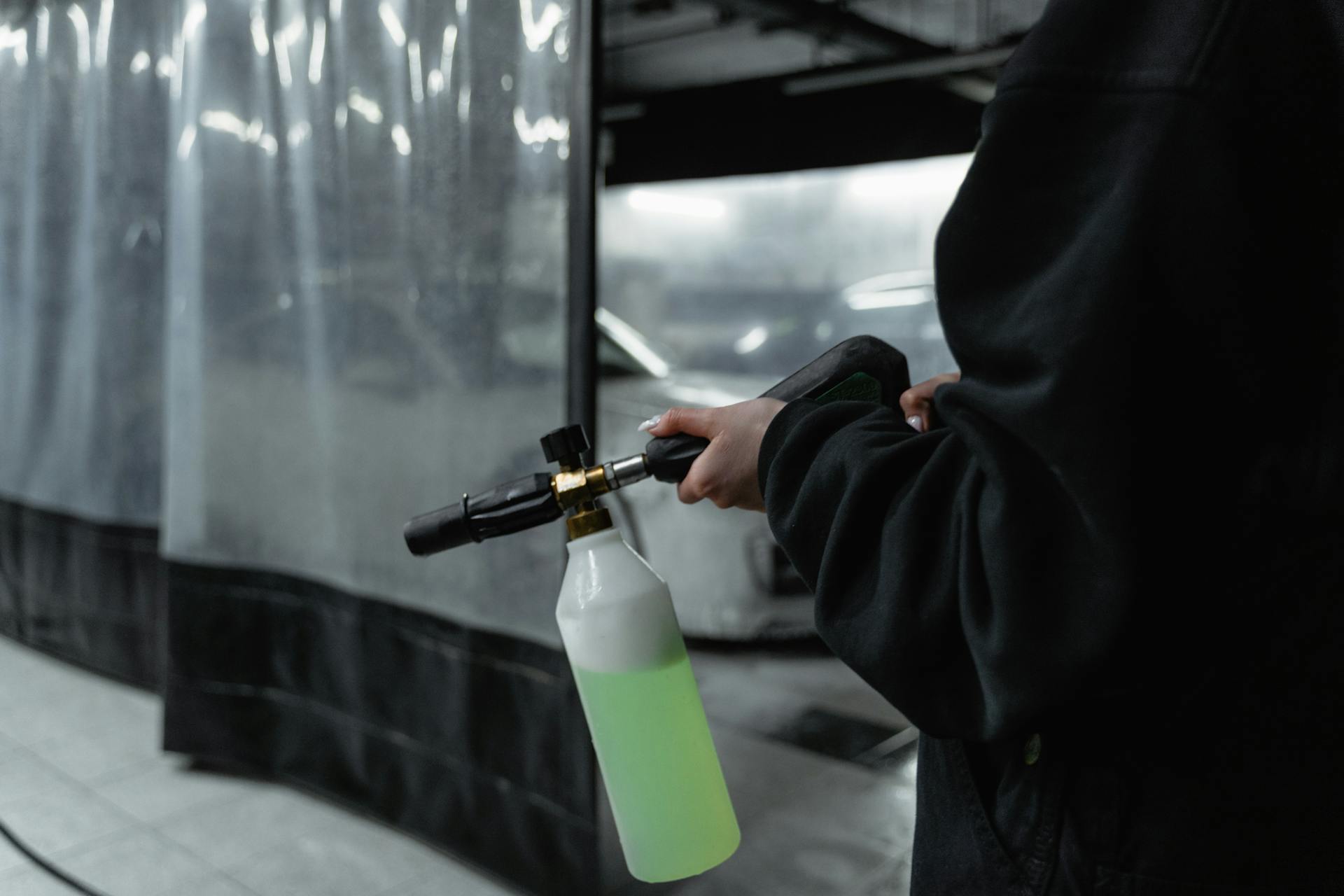
If you suspect your dog has ingested cockroach poison, it's crucial to act quickly. Some common symptoms to watch for include vomiting, diarrhea, lethargy, and difficulty breathing.
Cockroach poison is highly toxic to dogs, and even small amounts can cause severe reactions. The toxic compound, often found in gel baits or sprays, can cause severe damage to your dog's internal organs.
If left untreated, the symptoms can escalate, leading to seizures, tremors, and even death. According to studies, the median lethal dose of cockroach poison for dogs can be as low as 0.1 milligrams per kilogram of body weight.
The severity of symptoms depends on the amount and type of poison ingested, as well as the size and health of your dog.
Intriguing read: Dog Rat Poison Symptoms
Bait Consumed: What to Do
If your dog has consumed Combat Roach Bait, it's essential to act quickly. Your veterinarian will carefully examine your pooch and may induce vomiting to remove any poison residue.
The treatment will vary depending on your dog's symptoms and the veterinarian's findings. If poisoning is suspected, the doctor will work to reduce exposure and provide supportive care.
Your vet may administer activated charcoal to bind the toxic chemicals, provide IV fluids as supportive care, give anticonvulsant medications if your dog is seizing or has tremors, or provide oxygen if your pooch is having difficulty breathing.
Emergency care is initiated for choking, and in the case of obstruction, your doctor will perform surgery and provide supportive care. The recovery period varies depending on the effects of the bait.
Here's a breakdown of the recovery periods:
- For poisoning, symptoms usually resolve in a few days.
- For choking on packaging, dogs need 1-2 days to heal from localized damage and inflammation.
- For dogs that require surgery, the recovery period usually takes 4-6 weeks.
Symptoms and Signs
Symptoms of insecticide poisoning in dogs can occur within minutes or hours of exposure, and they can vary based on the active ingredient of the insecticide consumed.
Excessive drooling is a common symptom of insecticide poisoning in dogs, along with irritation to the skin, eyes, or mucous membranes.
Vomiting and diarrhea are also common symptoms, as are abdominal cramps or pain, and uncontrolled urination or defecation.
Weakness, incoordination, and collapse can occur, as well as trouble breathing, muscle spasms or tremors, and seizures or death.
If your dog eats a cockroach, you may see symptoms such as nausea, drooling and lip-licking, dehydration, and lack of appetite.
A cough, diarrhea, vomiting, abdominal discomfort, and tremors or shivers are also possible, as well as a high temperature, restlessness, and an uncoordinated gait.
If your dog eats Combat Roach Bait, you may see symptoms of mild digestive upset, such as vomiting and diarrhea.
However, if your dog swallows a large amount of bait or has an underlying condition, you may see more serious symptoms, including hypersalivation, lethargy, respiratory difficulty, and incoordination.
Muscle tremors, seizures, and excessive urination can also occur, and even if your dog doesn't eat enough bait to be poisoned, the packaging can cause choking or obstruction.
Here are some symptoms to watch out for:
- Nausea
- Drooling and lip-licking
- Dehydration
- Lack of appetite
- Coughing
- Diarrhea
- Vomiting
- Abdominal discomfort and/or guarding
- Tremors or shivers
- High temperature (fever)
- Restlessness
- Uncoordinated gait
Prevention and Prognosis
Early diagnosis and aggressive treatment are crucial in treating insecticide poisoning in dogs.
Dogs have their best chance of survival with quick identification of the toxin ingested and treatment by a veterinarian.
Insecticide poisoning can be deadly, but with prompt treatment, the prognosis is usually good.
Typically, dogs that recover go on to live normal lives with no secondary consequences.
Here's an interesting read: Treatment for Dog Poisoned by Rat Poison
Treatment and Response
If your dog eats cockroach poison, it's crucial to act quickly. Call your veterinarian or the Pet Poison Helpline immediately.
Your veterinarian will collect a thorough history, so have the product name, packaging, or detailed label ingredients ready. They may recommend inducing vomiting at the hospital as a means of decontamination, but only if your dog ate the poison within the past hour.
Your veterinarian may give activated charcoal to bind any additional toxin and wash off any insecticide or residue that may be present on the skin. In severe cases, your pet may need to be hospitalized for IV fluids and undergo additional therapy.
Here are some common treatments your veterinarian may administer:
- Induce vomiting to remove any poison residue
- Administer activated charcoal to bind the toxic chemicals
- Provide IV fluids as supportive care
- Give anticonvulsant medications if your dog is seizing or has tremors
- Provide oxygen if your pooch is having difficulty breathing
Early diagnosis and aggressive treatment are crucial in treating insecticide poisoning in dogs. With quick identification of the toxin ingested and treatment by a veterinarian, the prognosis is usually good.
Treatment of Insecticide
If your dog has ingested insecticide, it's essential to act quickly. Call your veterinarian immediately, providing them with the product name, packaging, or detailed label ingredients.
Your veterinarian will collect a thorough history and may recommend inducing vomiting at the hospital as a means of decontamination if your dog ate the insecticide within the past hour. Activated charcoal may also be given to bind any additional toxin.
In severe cases, hospitalization for IV fluids and additional therapy may be necessary. A complete blood count, serum blood chemistry, and urinalysis will likely be recommended for a baseline evaluation.
The treatment for insecticide poisoning will vary depending on the symptoms and the veterinarian's findings. Your veterinarian may induce vomiting, administer activated charcoal, provide IV fluids, give anticonvulsant medications, or provide oxygen.

Here's a summary of the treatment steps:
- Induce vomiting to remove any poison residue
- Administer activated charcoal to bind the toxic chemicals
- Provide IV fluids as supportive care
- Give anticonvulsant medications if your dog is seizing or has tremors
- Provide oxygen if your pooch is having difficulty breathing
The recovery period for your dog will depend on the effects of the insecticide. If poisoning is suspected, the doctor will work to reduce exposure and provide supportive care.
What to Do If You Lose Something
If you lose something, don't panic! It's unlikely you'll need to take drastic measures, but it's always a good idea to monitor the situation and take steps to prevent further issues.
Don't react negatively to the situation or yourself, just like you wouldn't punish your dog for eating a cockroach. They're just following their instincts, and you can follow a similar approach to resolving the issue.
If you're worried about the lost item, keep an eye out for any signs of its return, just like you would monitor your dog's digestion after eating a cockroach. Sometimes, things can take a little longer to show up than expected, but with patience, you might be able to track it down.

If the lost item is something important, like a medication or a valuable item, make sure to keep track of its status and take steps to limit its disappearance in the future. Keeping up to date with your schedules, like your dog's vaccine and worming schedules, can help prevent similar issues from arising.
Here are some general tips for dealing with lost items:
- Don't give up hope! Sometimes, lost items can turn up in unexpected places.
- Keep a record of the item and its last known whereabouts.
- Take steps to prevent similar losses in the future, like securing loose items or keeping track of your belongings.
Understanding Insecticides
Insecticides are chemicals designed to kill or repel insects, and there are over 400 chemical compounds and 17,000 products on the market.
The EPA recognizes 20 different classes of insecticides, with organophosphates being the most widely used today.
These chemicals can be toxic to dogs, causing symptoms like excessive drooling, vomiting, and muscle spasms.
The top four U.S. insecticide active ingredients include organophosphates, carbamates, pyrethrin/pyrethroids, and other classes.
Organophosphates, in particular, work by blocking an enzyme called acetylcholinesterase, which can lead to nerve cell overstimulation and death.
If your dog is exposed to an insecticide, it's essential to call the Pet Poison Helpline (855-764-7661) or the ASPCA Animal Poison Control Center (888-426-4435) for guidance.
Here are some common symptoms of insecticide poisoning in dogs:
- Excessive drooling
- Irritation to the skin, eyes, or mucous membranes
- Vomiting/diarrhea
- Abdominal cramps or pain
- Uncontrolled urination or defecation
- Weakness/incoordination/collapse
- Trouble breathing
- Muscle spasms or tremors
- Seizures/death
Veterinary Care and Support
If your dog eats cockroach poison, it's crucial to act fast. Immediately call your veterinarian, as the poison can be fatal if left untreated.
Your veterinarian will carefully examine your dog and may induce vomiting to remove any poison residue, administer activated charcoal to bind the toxic chemicals, or provide IV fluids as supportive care. They may also give anticonvulsant medications if your dog is seizing or has tremors, or provide oxygen if your dog is having difficulty breathing.
The treatment will vary depending on your dog's symptoms and the veterinarian's findings, but emergency care is initiated for choking, and surgery may be performed in the case of obstruction.
Monitor Your Pet
It's essential to monitor your pet after they've been exposed to a potentially toxic substance like insecticide or roach bait.
Dogs are extremely curious, so it's crucial to keep an eye on them, especially after they've been near areas where insecticide has been sprayed.
Lack of supervision can lead to a stressed or uncomfortable situation, even if your vet declares them to be out of danger.
The poisons in Combat roach bait are rarely toxic to dogs, but it's still important to monitor their behavior.
If your dog eats fipronil or hydramethylnon, most of it will be excreted in their urine and feces, but it's still a good idea to keep an eye on them.
You should look out for potential signs of stress or discomfort in your pet, even after they've been cleared by a vet.
It's best to take precautions and not leave a potentially deadly substance around your home unattended, especially if you have kids or pets.
On a similar theme: Is Plant Food Toxic to Dogs
Call Your Veterinarian Immediately
If your dog has consumed Combat Roach Bait, immediately call your veterinarian. This is crucial because the bait is poisonous for your dog.
The amount of poison consumed plays a significant role in determining the severity of the situation. If your dog has consumed large portions of the poison, it may prove fatal.
Take your pet to the veterinarian without wasting any time. The veterinarian will take the necessary steps to ensure your dog's health and safety.
How My Vet Treats After Eating Bait
If your dog eats insecticide or bait, your vet's treatment plan will depend on the type and amount consumed, as well as your dog's symptoms. They'll work to reduce exposure and provide supportive care.
Your vet may induce vomiting to remove any poison residue, especially if your dog ate enough Combat roach bait to reach toxic levels. This is a crucial step in removing the toxic chemicals from your dog's system.
Activated charcoal may be administered to bind the toxic chemicals and prevent further absorption. This can help reduce the severity of symptoms and promote a faster recovery.
Your vet will also provide IV fluids as supportive care to help flush out the toxins and keep your dog hydrated. This is especially important if your dog is having difficulty breathing or is showing signs of severe poisoning.
In some cases, anticonvulsant medications may be given if your dog is seizing or has tremors. Oxygen therapy may also be provided if your dog is having trouble breathing.
The recovery period for your dog will vary depending on the effects of the poisoning or obstruction. If your dog experiences poisoning from Combat roach bait, symptoms usually resolve in a few days. If your dog chokes on packaging, it may take 1-2 days to heal from localized damage and inflammation. Surgery may be required for more severe cases, and the recovery period can take 4-6 weeks.
Consider reading: Antifreeze Dog Poison Symptoms
Risk and Contamination
Cockroach poison can be extremely toxic to dogs, and even small amounts can cause severe harm or even death.
If your dog ingests cockroach poison, it can lead to symptoms such as vomiting, diarrhea, and abdominal pain.
The active ingredients in cockroach poison, such as fipronil and hydramethylnon, can cause neurological problems in dogs, including tremors, seizures, and even coma.
These symptoms can occur within hours of ingestion, and prompt veterinary attention is essential to prevent long-term damage or death.
According to the Centers for Disease Control and Prevention (CDC), cockroach poison can also cause liver and kidney damage in dogs.
The risk of contamination is higher if the cockroach poison is not stored properly, as it can be easily accessed by pets.
The American Society for the Prevention of Cruelty to Animals (ASPCA) recommends keeping cockroach poison in a secure location, out of reach of pets and children.
Additional reading: Preventing Dog Bites
Featured Images: pexels.com


